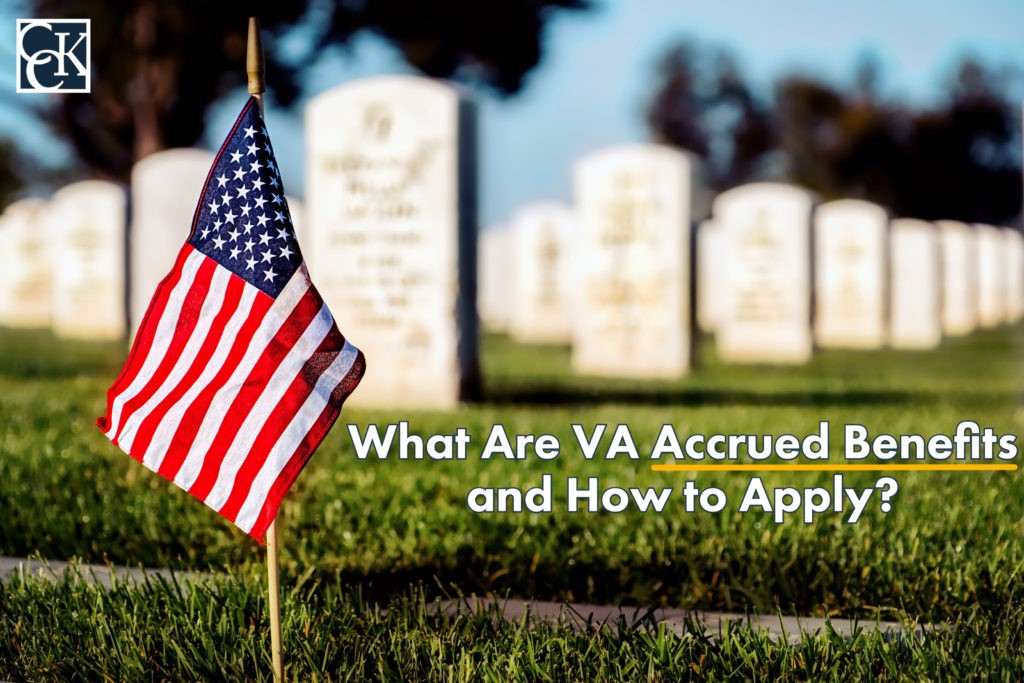What Are VA Accrued Benefits and How to Apply?

CCK Law: Our Vital Role in Veterans Law
VA Accrued Benefits
VA accrued benefits are benefits that are due, but not paid prior to a veteran’s death. Generally speaking, eligibility for accrued benefits depends upon whether the veteran had a claim pending, or was otherwise entitled to benefits, at the time of his or her death.
In determining entitlement to VA accrued benefits, VA must look at the evidence in the veteran’s file at the time of death. According to VA, examples of accrued benefits include the following:
- A claim or appeal for a recurring benefit (e.g. service-connected compensation) was pending at the time of death, but all evidence needed for a favorable decision was in VA’s possession.
- A claim for a recurring benefit has been allowed, but the veteran died before the award was issued.
In other words, for accrued benefits to be a possibility, there must have been (1) a claim for benefits that was not yet decided at the time of the veteran’s death, or (2) if the claim was decided, the appeal period for that claim must not have expired. As such, VA accrued benefits end up being the retroactive pay, or back pay, that the veteran would have received if alive. However, the surviving dependent will only receive compensation up to the date that the veteran passed away, not up to the date the benefits were granted by VA.
Who is Entitled to VA Accrued Benefits?
VA accrued benefits are not considered death or survivors benefits, since these benefits were owed to the veteran before their death. Therefore, VA accrued benefits are based on the veteran’s entitlement, not the survivor’s entitlement. However, a veteran’s surviving spouse, children, and dependent parents may be eligible to receive accrued benefits, which are paid as follows:
- Surviving Spouse: The full amount of VA accrued benefits is paid to a deceased veteran’s surviving spouse.
- Surviving Children: If there is no surviving spouse, VA accrued benefits are paid in equal shares to a deceased veteran’s children (i.e., children under 18 years old, children between the ages 18 and 23 who are attending school, and those who are found helpless).
- Surviving Parents: If the deceased veteran does not have any surviving children, VA accrued benefits will be paid to his or her dependent parents. If both parents are entitled, the benefits will be split evenly. If only one parent is entitled, he or she will be paid the full amount.
Importantly, a claim for accrued benefits must be filed within one year after the date of the veteran’s death. Again, all claims for accrued benefits must stem from the deceased veteran’s existing claim for benefits. This means that a surviving spouse, child, or dependent parent may not reopen or reargue a claim that was previously decided and became final.
If there is no entitled living person based on the relationships outlined above, VA will reimburse the person who paid for, or was responsible for, the veteran’s last illness and burial expenses.
A claim for accrued benefits must be filed within one year of the veteran’s death. To file, the eligible living person should fill out VA Form 21-534 and submit it to VA. This is the same form that would be used when filing for Dependency and Indemnity Compensation (DIC).
Accrued benefits differ from dependency and indemnity compensation in that DIC benefits are based on the eligible survivor’s claim that the veteran died of a condition caused by service, whereas accrued benefits stem from the veteran’s claim itself. The form will call for certain information, such as identifying information for the veteran, the veteran’s service, and the relationship of the veteran to the person completing the form.

What is VA Substitution?
When a veteran passes away while a claim for VA disability benefits is still pending, an eligible individual may be substituted into the veteran’s case to continue the claim for benefits. If this occurs, the claim will proceed as it would have if the veteran were still alive, allowing additional evidence to be added to the file. Like a claim for accrued benefits, eligible dependents must apply for substitution within one year of the veteran’s death.
In the event that VA grants substitution, that alone will not mean the surviving spouse or dependent will receive benefits. The individual who is substituted in will only receive compensation (i.e., accrued benefits) if the veteran’s claim for compensation is eventually granted.
For example, if a veteran filed a claim for traumatic brain injury prior to their death, and that claim remains open and pending, an eligible person may be substituted into that claim once the veteran has passed. The eligible person may be substituted into the traumatic brain injury claim so that VA may continue adjudicating the claim. In the instance that VA grants service connection for the veteran’s traumatic brain injury, the eligible survivor can then receive the retroactive, or accrued, benefits. Importantly, the eligible survivor will not receive any future benefits that the veteran might have been eligible to receive.
Getting Assistance with Accrued Benefits and Substitution
Accrued benefits, and the process of substitution, can be a complicated and time-sensitive matter. If you need assistance with the process of substitution, the team of veterans’ lawyers at Chisholm Chisholm & Kilpatrick LTD may be able to help. For a free case evaluation with a member of our staff, call us at 800-544-9144.
About the Author
Share this Post
